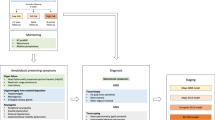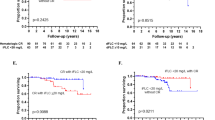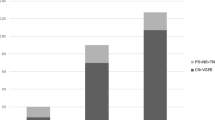Abstract
AL amyloidosis is an infiltrative disorder characterized by the extracellular deposition of insoluble fibrillar immunoglobulin light chains whose production results from a plasma cell dyscrasia. Treatment with melphalan has resulted in an improvement in a few patients. Recently, intensive chemotherapy followed by autologous or syngeneic stem cell support has been shown to offer potential benefit. Allogeneic stem cell support after intensive therapy would retain the benefits of autologous transplantation, with the additional advantages of a tumor-free graft and of a possible graft-versus-tumor effect. We report a patient with AL amyloidosis and significant proteinuria. She improved after an allogeneic bone marrow transplantation.
This is a preview of subscription content, access via your institution
Access options
Subscribe to this journal
Receive 12 print issues and online access
$259.00 per year
only $21.58 per issue
Buy this article
- Purchase on Springer Link
- Instant access to full article PDF
Prices may be subject to local taxes which are calculated during checkout
Similar content being viewed by others
Author information
Authors and Affiliations
Rights and permissions
About this article
Cite this article
Guillaume, B., Straetmans, N., Jadoul, M. et al. Allogeneic bone marrow transplantation for AL amyloidosis. Bone Marrow Transplant 20, 907–908 (1997). https://doi.org/10.1038/sj.bmt.1700983
Received:
Accepted:
Issue Date:
DOI: https://doi.org/10.1038/sj.bmt.1700983
Keywords
This article is cited by
-
Light-chain amyloidosis: SCT, novel agents and beyond
Bone Marrow Transplantation (2013)
-
Light chain (AL) amyloidosis: update on diagnosis and management
Journal of Hematology & Oncology (2011)
-
Long-term successful outcome of sequential cardiac and allogeneic bone marrow transplantations in severe AL amyloidosis
Bone Marrow Transplantation (2005)
-
High incidence of gastrointestinal tract bleeding after autologous stem cell transplant for primary systemic amyloidosis
Bone Marrow Transplantation (2001)
-
Blood stem cell transplantation as therapy for primary systemic amyloidosis (AL)
Bone Marrow Transplantation (2000)



